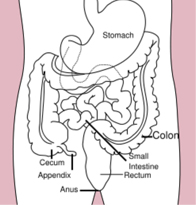The appendix in is located in the lower part of the right side of the abdomen. It’s function remains a mystery, however it is apparent that humans can cope perfectly normally with out one. It very frequently becomes inflamed in people of all ages and its removal is one of the commonest operations performed.

What are the complications of appendix operations?
Complications after appendix operations are uncommon.
- Wound infections occur in approx. 5% of patients.
- Infections or abscesses forming in the abdomen after bad appendicitis do occur and may require further drainage.
- Damage to bowel, bladder or blood vessels.
- Bleeding.
- Other Infections, pneumonia, urine, IV line related.
- Clots in the legs that may travel to the lungs.
- Temporarily unable to pass urine – you may require a urinary catheter for a day or two.
- Wound pain and prolonged numbness under the wound.
- Hernia of the wound.
- Bowel obstruction due to hernia or adhesions
- Allergic reaction to the anaesthetic
- Death: is exceptionally rare after operations to remove the appendix
Costs to be incurred from this surgery
- Outpatient consultations are not covered by the health funds and there will be a charge for this consultation. You will get a proportion of this money back from Medicare. If this fee is paid at the time of the initial consultation, your health fund will be billed directly for your surgery and there will be no out of pocket surgeon fee for the inpatient portion of your care.
- There may be other out-of-pocket fees from your anaesthetist and any other specialists who are asked to look after you. You should ask them ahead of time any out of pocket costs.
- Ask your surgeon who will be performing your anaesthetic and you can make enquiries with them about any out-of-pocket expenses.
- You will also have to pay any hospital excesses that your policy dictates.
What does the operation involve?
The operation is usually done within 24 hours of the diagnosis of appendicitis having been made. Most commonly, the appendix is removed via keyhole (laparoscopic) surgery. This is done with three small cuts in the lower abdomen and a small telescope and long instruments are inserted. A tie is placed around the base of the appendix and it is removed. The operation takes anywhere from 10 minutes to an hour depending on how inflamed it is.
Sometimes, the appendix cannot be removed by keyhole surgery and the surgeon will have to make an incision directly over the appendix to remove it. Common reasons for this are; burst appendix, bleeding that is difficult to control with keyhole surgery or if the appendix is in a difficult position and cannot be reached with the long instruments.
There is very little difference in the recovery time between the open and key- hole operations.
Occasionally the surgeon can find that something other than your appendix is causing your symptoms. The surgeon will then make a decision about what is best for your care. This may also require a larger incision.
Your surgeon will give you one or more doses of antibiotics depending on how inflamed your appendix is.
